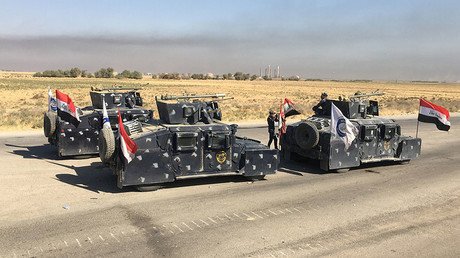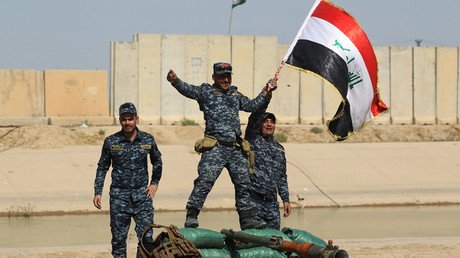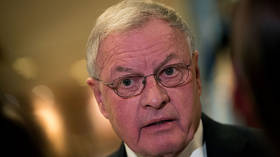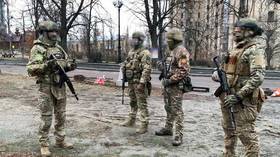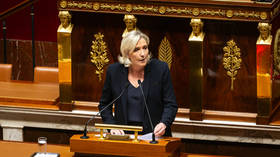Iraqi forces taking over Kirkuk ‘a declaration of war’ – Kurdish Peshmerga
Iraqi soldiers have raised their country’s flags over key buildings in Kirkuk, and Baghdad has declared the Kurdish city be under government control. The Kurdish Peshmerga forces called the takeover “a flagrant declaration of war” and vowed that Iraq will pay a “heavy price.”
READ MORE: Iraqi military advances in Kirkuk, captures key positions from Kurdish forces
The Iraqi government forces have taken full control of Kirkuk, Al Jazeera and Sky News Arabia report, citing the central government in Baghdad.
The Iraqi Prime Minister Haider al-Abadi’s has ordered to raise the Iraqi flag over the city and other Kurdish-controlled areas.
Iraqi soldiers lower #Kurdistan's flag in Kirkuk, throwing it on the floor as they enter the city with Hashd al-Shaabi. #KurdistanBlockadepic.twitter.com/xOiu1Yx6eL
— Rudaw English (@RudawEnglish) October 16, 2017
The “attack” on Kurdish-controlled Kirkuk by Iraqi troops is “a flagrant declaration of war against the nation of Kurdistan,” the Peshmerga General Command said in a statement earlier, as cited by Rudaw.
The Peshmerga described Baghdad’s move as “retaliation against the right of the people to vote on their fate,” referring to last month’s referendum on Kurdistan’s independence, in which 92.7 percent voted to secede from Iraq.
The Monday developments reveal a split in Kurdish factions, as some of the militias were reported to leave Kirkuk without a fight amid reports of clashes between the Iraqi Army and the Peshmerga.
In a statement, the Peshmerga accused a faction from one of the two main Iraqi Kurdish political parties, the ruling Patriotic Union of Kurdistan (PUK), of “plotting” against the Kurds and committing “a great and historic treason.”
Iraqi Prime Minister Haider al-Abadi earlier said the operation was aimed at protecting the unity of Iraq following Kurdistan’s independence vote.
“It is my constitutional duty to work for the benefit of the citizens and to protect our national unity that came under threat of fragmentation as a result of the referendum that was organized by the Kurdish region,” al-Abadi said in a statement.
The Prime Minister added that the vote was held in violation of the constitution and said that the Kurds “chose their personal interests over Iraq’s interests.”
Kurdish leader Masoud Barzani ordered Peshmerga forces to not attack the Iraqi military first, but gave a “green light to use every power” to fight against the advancing forces, according to Hemin Hawrami, a senior assistant to Barzani.
The US-led anti-Islamic State (IS, formerly ISIS/ISIL) coalition claimed that the maneuvers “of military vehicles and personnel” in the vicinity of Kirkuk “so far have been coordinated movements, not attacks,” while the clashes between Peshmerga and Iraqi government forces were a mere “misunderstanding.”
“Coalition forces and advisers are not supporting Government of Iraq or Kurdistan Regional Government activities near Kirkuk, but are aware of reports of a limited exchange of fire during predawn hours of darkness October 16. We believe the engagement this morning was a misunderstanding and not deliberate as two elements attempted to link up under limited visibility conditions,” the coalition said in a statement.
Hundreds of people in Kirkuk took to the streets to celebrate the takeover of the city by Iraqi government forces. A video posted on social media shows a group of people with Iraqi flags greeting government troops in front of the city’s governorate building.
Iranian-backed Shia militia flags are widely raised inside #Kirkuk following today's assault against #Peshmerga forces. #SupportKurdistanpic.twitter.com/3AiIxgYJd0
— Kurdistan 24 English (@K24English) 16 октября 2017 г.
The majority of demonstrators are reportedly of Arab or Turkmen origin, while thousands of ethnic Kurds fled the city alongside the Peshmerga forces. Some ethnic Kurds, however, also appear to be welcoming the government troops.
#kirkuk a kurdish civilian greeting Iraqi forces and thanking them saying he is against erbil. pic.twitter.com/YZCVTarSC6
— Steven nabil (@thestevennabil) 16 октября 2017 г.
Oil field control
Immediately after the Iraqi forces made their Kirkuk move, conflicting reports began coming in about the Kurdish-controlled oil fields and facilities in the region. Media reports indicate two oilfields – Bai Hassan and Avana – shut down production.
The reports were followed by indirect threats from Baghdad. Iraqi forces could be deployed “in a very short time” to regain control over Kirkuk oilfields and restart oil production, a senior Iraqi oil official was cited by Reuters as saying.
“We will not allow them to shut down production. We’ve got confirmation from military commanders that it’s a matter of a very short time,” the official said.
The Kurdish Ministry of Natural Resources, however, tweeted that the reports were “not true.”
Earlier, a spokesman for North Oil Company said the oil ministry had warned the Kurdish authorities against any action “that would cause crude oil flow disruption from Kirkuk oilfield.” The company has asked the central government and oil ministry to deploy “security forces to intervene and prevent Kurdish crews from mismanaging production,” according to the spokesman.
READ MORE: Kurdistan accuses Baghdad of planning oil field seizure
